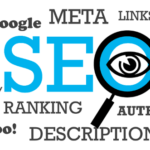Summary
Both SEO and SEM aim to improve the website’s visibility on specific search outcomes and increase traffic through cohesive and robust strategies. Read through the blog to unravel the differences and benefits of these terms to take your digital marketing game a notch.

Introduction
SEO and SEM are the strongest pillars in the digital marketing industry and have played a huge role in improving several businesses online visibility and digital presence. While SEO and SEM are distinct techniques, they can create an all-encompassing and robust online marketing strategy. SEO is a long-term strategy focusing on gradually increasing organic search traffic, whereas SEM can provide more immediate results through paid advertising.
Let us dive deeper into the topic to unravel the meaning of both terms and gradually leverage them to make the best strategies.
What are SEO and SEM in digital marketing?
SEO stands for Search Engine Optimization, which refers to enhancing a website’s ranking in search engine results pages (SERPs) for relevant keywords and phrases. SEO entails on-page and off-page optimization (e.g., optimising content, meta tags, and URLs) (e.g., building backlinks and improving social signals). The ultimate goal of SEO is to improve a website’s overall online visibility by increasing organic search traffic.
SEM is an abbreviation for Search Engine Marketing, which drives traffic to a website through paid advertising on search engines. Pay-Per-Click (PPC) advertising is a type of SEM that involves paying to have ads appear at the top of search engine results pages for specific keywords or phrases. SEM can also include other types of paid advertising, such as display advertising.
Read through the blog to understand how the best digital marketing agency in Chennai utilises these strategies to maintain a digital presence and edge over others with the help of SEO professionals equipped with top-notch expertise.
Why are SEO and SEM important?
Search engine optimization and Search engine marketing play a pivotal role because they help to increase visibility and online traffic and ultimately increase the potential revenue returns. So let us discuss them in detail to garner more valuable insights into their benefits:
SEO:
- Improves website visibility: SEO helps rank websites higher on the search engine results page and increase visibility by driving more potential traffic.
- Builds credibility and trust: By ranking high on the search engine results page, SEO efforts help the website owners set their business as the authoritative leaders and thus help build credibility and trust among potential customers.
- Cost-effective: Compared to paid advertising efforts, SEO intends to be more cost-effective in the long run for several businesses.
- Long-lasting results: Unlike paid advertising, SEO results can be more long-lasting, which means your website can continue to rank well even after you stop investing in SEO. It also allows you to track and analyse your website’s performance, giving you valuable insights into user behavior and making data-driven decisions to improve your website’s effectiveness.
- Improves user experience: By optimising the website content, SEO efforts help to enhance the user experience by making it more user-friendly and easier to navigate.
- Competitive advantage: A comprehensive and robust SEO strategy helps the website to stay ahead of others, with high search engine rankings and attracting more engagement from potential users.
SEM:
- Measurable results: SEM provides measurable results for businesses, allowing them to track the success of their campaigns and make data-driven decisions to optimise their advertising efforts.
- Enhances brand awareness: SEM can increase brand awareness and recognition by promoting a business’s website and products/services in search engine results pages.
- Enables budget control: Businesses can use SEM to set a maximum bid for each click on their ads, which can help control costs by preventing bids from exceeding a predetermined budget.
Which is better: SEO or SEM?
| BASIS | SEO | SEM |
| Aim | SEO (Search Engine Optimization) aims to optimise a website’s content and structure to improve its visibility and ranking on search engine results pages, resulting in more organic traffic.
|
SEM (Search Engine Marketing) aims to promote a website via paid advertising campaigns on search engines to increase visibility, drive traffic, and generate conversions.
|
| Time taken | SEO efforts take time to show results in the long run. An SEO campaign can take several months to produce significant results, and ongoing maintenance and optimization are required to maintain and improve rankings over time. | Conversely, SEM refers to paid advertising campaigns aimed at increasing website traffic and conversions. SEM campaigns can be set up quickly, and results can be seen almost immediately after launch.
|
| Cost | The cost of SEO depends upon hiring the SEO agency and investing their resources and efforts in improving website rankings, optimising website content, building quality backlinks, and enhancing user experience. In a nutshell, it is a low-cost strategy compared to paid advertising to build industry competitiveness.
|
SEM requires a budget for ad campaigns, which is expensive compared to SEO efforts and strategies for highly competitive keywords. The cost of SEM can vary depending on the industry’s competitiveness, the keywords used, and the target audience. |
| CTR Quality results | Organic results tend to have a higher CTR compared to paid search results. Because they are based on relevance and authority, they satisfy user intent with quality content.
|
The click-through rate of SEM is low compared to SEO efforts, as users believe organic results are more effective and credible. |
| Search results | Search Engine Optimization (SEO) results appear in plain text, which means that marketers need to rely on the effectiveness of the title and meta description to attract clicks. | Search Engine Marketing (SEM) offers additional features such as calls, site links, and other ad extensions that can enhance the appearance of search results. In addition, paid campaigns can significantly improve the presentation of product listings. |
| Traffic potential | SEO focuses on gradually improving organic search rankings, which can increase visibility and traffic from search engines.
|
Through paid advertising campaigns, SEM, on the other hand, can provide immediate visibility and traffic. Both approaches can effectively increase traffic and visibility, and many businesses employ SEO and SEM tactics to achieve their objectives.
|
| ROI | SEO efforts generate better returns compared to SEM or paid advertising if properly optimised for better rankings. | SEM requires continuous investment in the campaigns to generate more traffic and visibility. Thus the cost per lead of paid advertising is higher and will generate results until kept paid. |
| Competition | The competition is gradually less due to organic search results. | The competition in paid advertising is high due to high competitive keywords targeted toward the targeted audience. |
Wrapping Up
We hope the above-listed points gave you valuable insights into the difference between SEO and SEM terminologies and their benefits. They both are the strongest pillars in digital marketing but differ in their aim, cost, and approach to improving website search engine rankings.
While SEO is concerned with increasing organic search rankings, SEM includes paid search advertising. Both strategies are critical for increasing website traffic, and a well-rounded digital marketing campaign should include elements of both SEO and SEM.
The best digital marketing agencies encompass strategies to increase visibility and rankings compared to others. echoVME Digital , the best SEO agency in Chennai, implements the best SEO practices, to garner more views, engagement, search engine rankings, for their clients to deliver the best results.
Join 25,000+ smart readers—don’t miss out!







